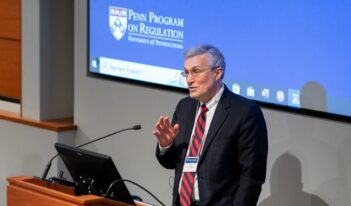
A federal report reveals undisclosed foreign ties among some scientists, raising unique concerns.
A professor at Emory University was fired and charged with theft of grant funds in 2019 after he was allegedly paid $500,000 of unreported funding by Chinese research institutions to conduct years of research at Chinese labs without his employer’s knowledge.
This case is just one example of a growing trend in allegations of U.S. researchers receiving undisclosed support from foreign entities in exchange for access to scientific knowledge or influence within the United States.
Yet the major U.S. federal agencies that fund scientific research projects at educational institutions do not currently have sufficient safeguards in place to prevent foreign influence over their research, according to congressional testimony delivered in October by a senior official at the U.S. Government Accountability Office (GAO).
Last year, GAO released a report based on a review of the five agencies that account for the vast majority of all federal research and development expenditures at U.S. universities. GAO found that two of these agencies—the U.S. Department of Defense and the U.S. Department of Energy—lacked any agency-wide policies requiring researchers seeking funding to disclose conflicts of interest.
Three other agencies—the National Science Foundation (NSF), the National Institutes of Health (NIH), and the National Aeronautics and Space Administration (NASA)—did have conflict of interest policies, but none of these policies specifically addressed foreign financial interests or specified whether such interests are required to be reported.
GAO commissioned this report in the wake of recent concerns about foreign governments’ talent recruitment programs. It addressed worries that unapproved diversions of scientific research materials to foreign governments may threaten U.S. leadership in emerging science and technology, weaken innovation, threaten economic competitiveness, and violate the integrity of the U.S. research enterprise.
In a letter sent to over 10,000 U.S. universities in 2018, Francis Collins, the director of the NIH, claimed that foreign governments have mounted “systemic programs” to influence researchers at the NIH and other peer institutions. In particular, Collins noted his unease over efforts to divert intellectual property in biomedical research to other countries, attempts by foreign entities to influence NIH funding decisions, and the failures of many U.S. researchers to disclose when they received substantial resources from foreign organizations or governments.
In response to these concerns, the five agencies reviewed in the GAO report have taken preliminary steps to clarify their existing policies concerning foreign conflicts of interest and disclosure requirements. These measures include establishing working groups on identifying risks of foreign influence and conducting outreach to universities about these concerns, among other actions. As one example, the Defense Department established a task force to review regulations, procedures, and policies concerning the conduct of research. The agency reports to be working on identifying Chinese government-affiliated foreign talent recruitment programs for particular scrutiny.
These measures have produced results at some agencies to date, concludes GAO. For example, as of September 2020, the NIH had identified more than 200 scientists in the United States who were behaving in ways that threatened research security and integrity.
Based on interviews with officials from the five leading federal research agencies, university representatives and administrators, and researchers, GAO auditors identified five opportunities to improve the way the federal government addresses foreign influence in federally funded research.
For example, GAO recommended that agencies receiving federal funding for research harmonize their grant proposal requirements to ensure that all parties involved are aware of the risks of foreign influence. GAO also noted that these measures could help reduce the burden on universities, which often must ensure their researchers meet grant requirements for multiple agencies.
GAO also recommended that federal research agencies better communicate to universities the specific risks that they face concerning foreign influence, since many U.S. institutions do not yet have experience in trying to mitigate these risks. In addition, GAO offered guidance, based on input from university representatives, that federal agencies provide training to researchers on identifying and reporting potential foreign influences.
Agency and university officials range in their views as to whether researchers should be permitted to participate in foreign talent recruitment programs. NIH officials report that although some researchers readily disclose funding from these types of foreign sources, many fail to disclose funding from Chinese programs in particular. According to the NIH, these failures to report might be due to the fact that some contracts with foreign funding sources expressly prohibit researchers from disclosing their participation in such programs to grant-making agencies in the United States.
GAO notes, however, that the head researchers surveyed at various universities unanimously recommended that any researchers participating in these programs should at least disclose their involvement to their universities.
GAO concludes that if the five agencies noted in its report begin to fully implement its recommendations, they could improve their own abilities and enhance the capacity of U.S. universities to identify and mitigate conflicts of interest and ensure consistency in enforcement.



